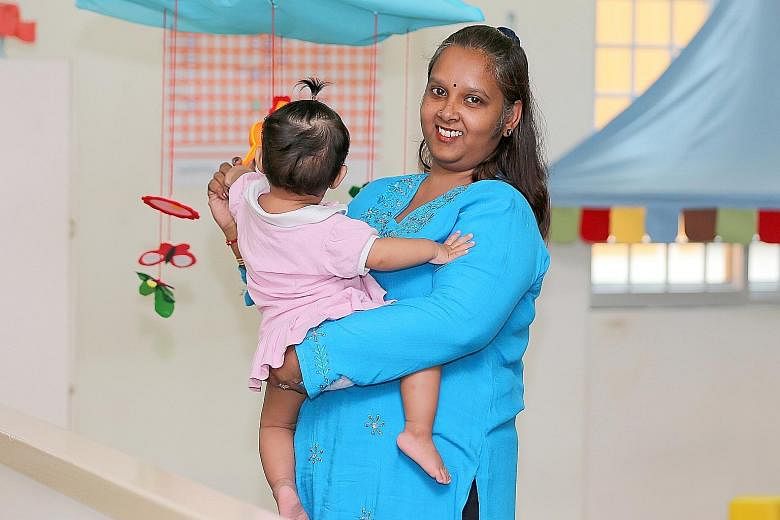Housewives and grandmothers are being wooed to enter the infant care sector, with a new training scheme that focuses more on hands-on practice.
Similar to an apprenticeship, it caters to people "including more mature women, who are not inclined towards long classroom-based training", said the Early Childhood Development Agency (ECDA).
The Government hopes to train about 200 allied infant educarers (AIEs) in the next two to three years under this scheme, to be piloted at the end of this month.
It is part of ECDA's plans to attract 1,000 more infant educarers - who work with children aged two months to 18 months - by 2020.
There are about 1,400 infant educarers now.
It is one of three initiatives announced in Parliament yesterday to attract and develop manpower in the early childhood sector, which is facing a chronic labour shortage. They support plans announced in the Budget speech last month to have 1,000 more infant care places by 2020 to meet demand.
Said Parliamentary Secretary for Social and Family Development Faishal Ibrahim during the debate on his ministry's budget: "We understand that some people with interest, aptitude and competence to care for infants may be unable to join the sector, either because they do not want to attend classroom-based training, or they lack the appropriate academic records."
He said the AIE scheme will focus on "aptitude and competency, rather than academic qualifications".
On-the-job training will take up 45 per cent of the course's 110 training hours. By contrast, an existing course for infant educarers runs for 300 hours, of which 40 per cent is spent on on-the-job training. This gives them more guidance on planning activities for children.
The new scheme aims to give trainees "fundamental skills for quality infant care", for instance in feeding.
An ECDA spokesman said the AIEs can be counted as programme staff, who are factored in pre-schools' staff-child ratio requirements. "They will support the certified infant educarers and work under the close supervision of a senior infant educarer," he said.
The scheme will start with about 30 childcare centres run by anchor operators, which get government grants and priority in securing sites to set up centres but have to meet fee caps and quality criteria.
Ms Tin Pei Ling (MacPherson) asked if the AIE scheme will compromise the quality of infant care.
In response, Dr Faishal said safeguards are in place: Operators will nominate "only experienced senior infant educarers" to mentor the AIEs, and regulations will ensure standards are upheld. The hands-on training will also be based on real-life scenarios.
"I think this will translate into better quality services for our infants and our parents," he said.
Ms Nyaneswari Paramasivam, 35, of My First Skool will be among the first batch of AIEs trained. She used to work in another centre as an untrained employee for two years, then took on jobs in other industries. The classroom training in courses made her reluctant to return to the sector. The mother of two said: "It's good to focus on hands-on practice, because you need that to know how to manage kids."
Ms Loy Wee Mee, director of Pre- School By-The-Park, welcomed the scheme but hoped it would be rolled out to other operators later.
She said it is harder to attract infant educarers as their jobs are perceived to "involve a lot of nannying" but they support children in reaching developmental milestones too.
"Any increase in supply of infant educarers is welcome, but the importance of classroom training should not be underestimated."
Other initiatives announced yesterday include a new professional development programme for those who work with children aged two months to four years. There will also be an advanced diploma course for experienced teachers to prepare them for leadership roles.


